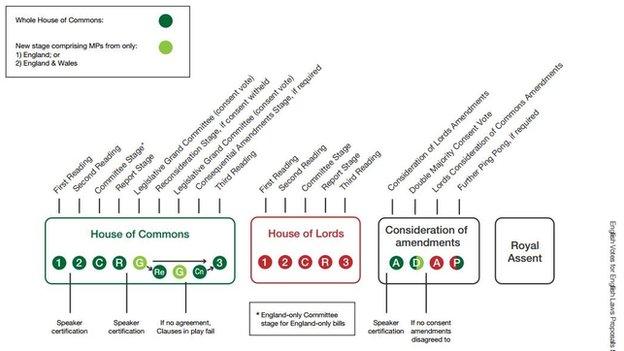English Votes for English Laws explained
- Published
- comments

English Votes for English Laws - an outline of the model for a Bill starting in the House of Commons
What do you mean, it looks complicated? The diagram is from the government's "explanatory guide" to its plans for "English votes for English laws".
It's a tale of vetoes, legislative grand committees, double majorities and "tablet computers" in division lobbies.
Commons leader Chris Grayling says it's only fair to give English MPs a stronger voice on English matters. But that means less of a voice for MPs from Wales, even if their constituents access public services in England.
Conservative former Welsh Secretary David Jones raised the issue on behalf of his constituents who were "heavily reliant" on services such as the NHS across the border.
Mr Grayling told him: "I am acutely aware of the issues affected by people, particularly in north Wales, where there are cross-border issues and where often Manchester and Liverpool can seem closer to north Wales than Cardiff does.
"But nonetheless it is the case of course that a matter like health in Wales is devolved and is a matter for Welsh assembly and therefore whilst he can vote on health matters across England the same doesn't apply the other way round but his position in this House will remain, that he is able as a Welsh Member of Parliament to vote on, to contribute to decision-making about health service matters in England in the way he does at the moment but those matters cannot simply be imposed on the English against their wishes."
English MPs are not the only ones who have no vote on health services matters in Wales - Mr Jones and other Welsh MPs have has no formal role in the running of the NHS since it was devolved 16 years ago.
One consequence of the changes could affect frontbench roles at Westminster. Would Cardiff West MP Kevin Brennan still be able to lead for the opposition on English schools legislation if he couldn't take part in the committee stage?
You can read more about the changes